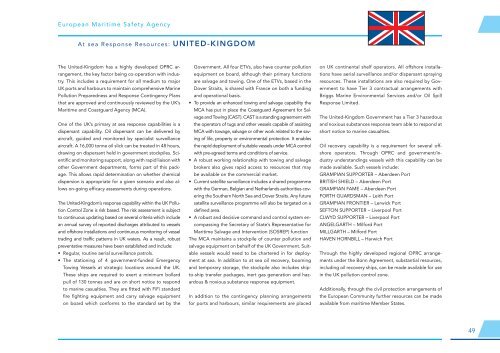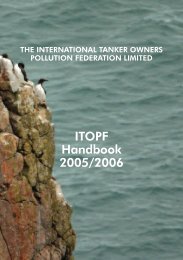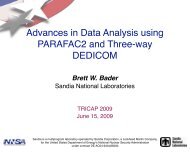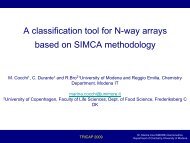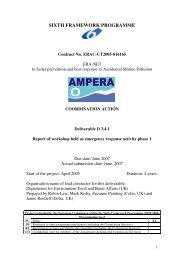Inventory of EU Member States Oil Pollution ... - EMSA - Europa
Inventory of EU Member States Oil Pollution ... - EMSA - Europa
Inventory of EU Member States Oil Pollution ... - EMSA - Europa
Create successful ePaper yourself
Turn your PDF publications into a flip-book with our unique Google optimized e-Paper software.
European Maritime Safety Agency<br />
At sea Response Resources: UNITED-KINGDOM<br />
The United-Kingdom has a highly developed OPRC arrangement,<br />
the key factor being co-operation with industry.<br />
This includes a requirement for all medium to major<br />
UK ports and harbours to maintain comprehensive Marine<br />
<strong>Pollution</strong> Preparedness and Response Contingency Plans<br />
that are approved and continuously reviewed by the UK’s<br />
Maritime and Coastguard Agency (MCA).<br />
One <strong>of</strong> the UK’s primary at sea response capabilities is a<br />
dispersant capability. <strong>Oil</strong> dispersant can be delivered by<br />
aircraft, guided and monitored by specialist surveillance<br />
aircraft. A 16,000 tonne oil slick can be treated in 48 hours,<br />
drawing on dispersant held in government stockpiles. Scientific<br />
and monitoring support, along with rapid liaison with<br />
other Government departments, forms part <strong>of</strong> this package.<br />
This allows rapid determination on whether chemical<br />
dispersion is appropriate for a given scenario and also allows<br />
on-going efficacy assessments during operations.<br />
The United-Kingdom’s response capability within the UK <strong>Pollution</strong><br />
Control Zone is risk based. The risk assessment is subject<br />
to continuous updating based on several criteria which include<br />
an annual survey <strong>of</strong> reported discharges attributed to vessels<br />
and <strong>of</strong>fshore installations and continuous monitoring <strong>of</strong> vessel<br />
trading and traffic patterns in UK waters. As a result, robust<br />
preventative measures have been established and include:<br />
• Regular, routine aerial surveillance patrols.<br />
• The stationing <strong>of</strong> 4 government-funded Emergency<br />
Towing Vessels at strategic locations around the UK.<br />
These ships are required to exert a minimum bollard<br />
pull <strong>of</strong> 130 tonnes and are on short notice to respond<br />
to marine casualties. They are fitted with FiFi standard<br />
fire fighting equipment and carry salvage equipment<br />
on board which conforms to the standard set by the<br />
Government. All four ETVs, also have counter pollution<br />
equipment on board, although their primary functions<br />
are salvage and towing. One <strong>of</strong> the ETVs, based in the<br />
Dover Straits, is shared with France on both a funding<br />
and operational basis.<br />
• To provide an enhanced towing and salvage capability the<br />
MCA has put in place the Coastguard Agreement for Salvage<br />
and Towing (CAST). CAST is a standing agreement with<br />
the operators <strong>of</strong> tugs and other vessels capable <strong>of</strong> assisting<br />
MCA with towage, salvage or other work related to the saving<br />
<strong>of</strong> life, property or environmental protection. It enables<br />
the rapid deployment <strong>of</strong> suitable vessels under MCA control<br />
with pre-agreed terms and conditions <strong>of</strong> service.<br />
• A robust working relationship with towing and salvage<br />
brokers also gives rapid access to resources that may<br />
be available on the commercial market.<br />
• Current satellite surveillance includes a shared programme<br />
with the German, Belgian and Netherlands authorities covering<br />
the Southern North Sea and Dover Straits. Any future<br />
satellite surveillance programme will also be targeted on a<br />
defined area.<br />
• A robust and decisive command and control system encompassing<br />
the Secretary <strong>of</strong> State’s Representative for<br />
Maritime Salvage and Intervention (SOSREP) function<br />
The MCA maintains a stockpile <strong>of</strong> counter pollution and<br />
salvage equipment on behalf <strong>of</strong> the UK Government. Suitable<br />
vessels would need to be chartered in for deployment<br />
at sea. In addition to at sea oil recovery, booming<br />
and temporary storage, the stockpile also includes shipto-ship<br />
transfer packages, inert gas generation and hazardous<br />
& noxious substance response equipment.<br />
In addition to the contingency planning arrangements<br />
for ports and harbours, similar requirements are placed<br />
on UK continental shelf operators. All <strong>of</strong>fshore installations<br />
have aerial surveillance and/or dispersant spraying<br />
resources. These installations are also required by Government<br />
to have Tier 3 contractual arrangements with<br />
Briggs Marine Environmental Services and/or <strong>Oil</strong> Spill<br />
Response Limited.<br />
The United-Kingdom Government has a Tier 3 hazardous<br />
and noxious substances response team able to respond at<br />
short notice to marine casualties.<br />
<strong>Oil</strong> recovery capability is a requirement for several <strong>of</strong>fshore<br />
operators. Through OPRC and government/industry<br />
understandings vessels with this capability can be<br />
made available. Such vessels include:<br />
GRAMPIAN SUPPORTER – Aberdeen Port<br />
BRITISH SHIELD – Aberdeen Port<br />
GRAMPIAN FAME – Aberdeen Port<br />
FORTH GUARDSMAN – Leith Port<br />
GRAMPIAN FRONTIER – Lerwick Port<br />
SEFTON SUPPORTER – Liverpool Port<br />
CLWYD SUPPORTER – Liverpool Port<br />
ANGELGARTH – Milford Port<br />
MILLGARTH – Milford Port<br />
HAVEN HORNBILL – Harwich Port<br />
Through the highly developed regional OPRC arrangements<br />
under the Bonn Agreement, substantial resources,<br />
including oil recovery ships, can be made available for use<br />
in the UK pollution control zone.<br />
Additionally, through the civil protection arrangements <strong>of</strong><br />
the European Community further resources can be made<br />
available from maritime <strong>Member</strong> <strong>States</strong>.<br />
49


